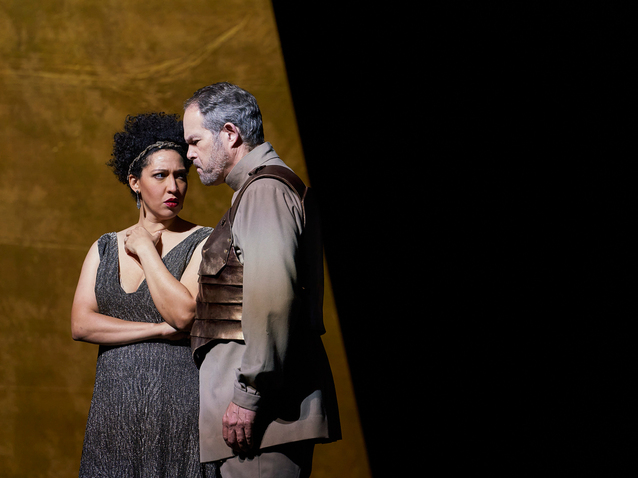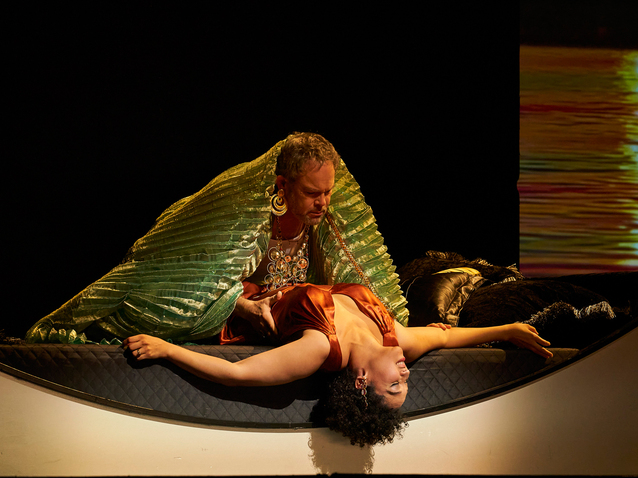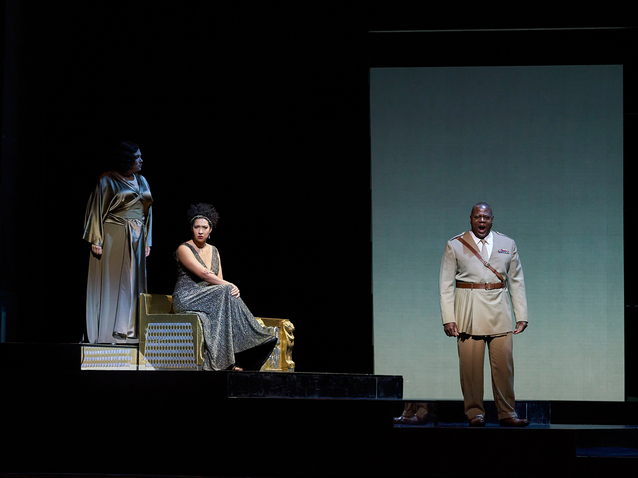 © Gran Teatre del Liceu
© Gran Teatre del Liceu
Big day at Liceu. The Barcelona theatre hosted the European premiere of Antony & Cleopatra, the new opera by John Adams, premiered in San Francisco in September 2022 and soon to travel to Palermo and New York.
The Barcelona performances had the added attraction of the presence on the orchestral podium of the composer himself, who was performing his work for the first time. In San Francisco the musical direction was in the hands of Eun Sun Kim, the theatre's chief conductor.
Antony & Cleopatrare volves around two axes: the power of eroticism and the eroticism of power. The story of love and death between the Roman general and the Egyptian queen unfolds on this dangerous two-way street. This is how Shakespeare saw it and told it to us; consequently, this is how the cinema understood it and passed it on to us and, finally, this is how John Adams has understood it.
Nothing new, then, from a dramatic point of view; Mark Antony and Cleopatra will destroy each other with the same passion with which they love each other, opening the way for Octavian, a skilful emperor who seems to be very sensitive to the eroticism of power and very little to the power of eroticism. Perhaps that is why he ruled for so many years.

Gerald Finley, Julia Bullock, Antony & Cleopatra (c) Gran Teatre del Liceu 2023
The libretto of the opera is by John Adams himself and is based mainly on Shakespeare's play of the same name with added passages from Plutarch, Virgil and other classical texts.
The dramaturgy of Antony & Cleopatra is complex and presents many references (perhaps even too many). On the one hand, the action takes place in the historical moment of the events, the 1st century BCbut without any "local colour" or period setting and in a very severe, abstract and essentialised scenic environment. On the other hand, the production echoes the cinematic "glamour" of the subject (according to Adams in an interview, Americans learn history by watching films and for them Cleopatra has the face of Elizabeth Taylor) which justifies the appearance on stage of "paparazzi" and old film cameras. The third reference is the supposed political totalitarianism of Octavian (Caesar in the Shakespearean narrative), which the production evokes through the militaristic Mussolinian paraphernalia materialised through costumes, gestures, and Bill Morrison's excellent videos.
The confusion could have been monumental, but the skill of Elkhanah Pulitzer, who signs the stage direction, makes all these multiple references fit together well and constructs a theatrically coherent if entirely predictable narrative. The only quibble might be found in the production's overuse of the "fascist" aesthetic. In recent years theatre has so often used this context to present all the "bad guys" that it has ended up becoming frivolous and dangerously trivialising something as serious and terrible as fascism. It seems that when one doesn't know how to present a tyrant on stage, one dresses him up as a fascist of eighty years ago (not of today, that could be dangerous) and that's all there is to it.
It is also worth noting that, for the first time in the history of Liceu, an "intimacy director" (Ita O'Brien) was involved for the physical interaction between performers, which was well resolved given the intense fierceness of their characters.

Julia Bullock, Alfred Walker, Antony & Cleopatra (c) Gran Teatre del Liceu 2023
Musically, Antony & Cleopatra embodies Adams' evolution from the minimalist presuppositions of Nixon in China, his first opera, towards more open and less militant models. In Antony & Cleopatra minimalism is now only a distant and ancient fragrance. The vocal writing, almost always individual and with very few concertante passages, too often remains in a kind of arioso that becomes monotonous, especially in the first part, where it rarely takes lyrical flight. In the second part, which is much more interesting vocally, the singing, which is almost always kept within fairly tonal parameters, becomes more intensely expressive.
One of the strong points of the score is to be found in the important orchestral interludes which separate the scenes and which are powerfully reminiscent of Britten's in Peter Grimes, although in some, the one preceding the scene of the battle of Actium for example, the evocation of the prelude to Wagner's Das Rheingold seems evident.
The orchestration is of very high quality. Adams, who may not be a great conductor, but conducted his work very well and obtained an optimal orchestral performance, has acknowledged with professionalism and humility that the orchestration could still be improved and, now that he has been able to hear it live, he does not rule out making some changes for the next New York premiere.
As for the singers, it should be said first of all that, following the composer's indications, the singing was amplified. The role of Cleopatra was played by Julia Bullock, the soprano for whom Adams conceived and wrote the part, but who was unable to take part in the full premiere because she was pregnant. Bullock, totally abducted by her character, gave a very good performance, although her voice suffered and sounded strained in the upper register.
Gerald Finley was vocally comfortable in the role of Antony who was almost always in the middle range. Scenically he gave a splendid recreation of a very complex character torn between sexual passion, a sense of duty and political ambition.
Tenor Paul Appleby was also very good in the histrionic and perhaps overly caricatured role of the calculating Caesar, the voice tended a little towards stridency, but the role demanded it.
Among the supporting characters, everything was very well resolved, with bass-baritone Alfred Walker as Enobarbus and Adriana Bignani Lesca as Charmian doing a superb job. Elizabeth DeShong acquitted herself well in the very thankless role of Octavia.
The chorus, who in Antony & Cleopatra have very little to do, spent more time parading and doing fascist salutes than singing.
Xavier Pujol
Barcelona, 2nd November 2023
Antony and Cleopatra by John Adams. Julia Bullock, soprano. Adriana Bignani Lesca, mezzosoprano. Gerald Finley, baritone. Alfred Walker, bass-baritone. Brenton Ryan, tenor. Milan Perišić, baritone. Paul Appleby, tenor. Guillem Batllori, baritone. Äneas Humm, baritone. Toni Marsol, baritone. Elizabeth DeShong, mezzosoprano. Marta Infante, mezzosoprano. Orchestra and Choir of Gran Teatre del Liceu. John Adams, conductor. Elkhanah Pulitzer, stage direction. Mimi Lien, scenography. Constance Hoffman, costumes. David Finn, lighting. Bill Morrison, video design. Ita O’Brien, Intimacy direction. Coproduction by Gran Teatre del Liceu, San Francisco Opera and Metropolitan Opera of New York. Gran Teatre del Liceu
the 04 of November, 2023 | Print
Comments